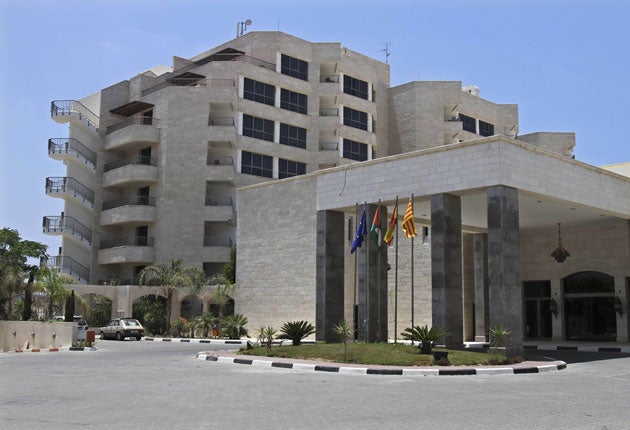Gaza's first five-star hotel has everything – except anyone who wants to stay there
Bulk of 220 rooms allowed to lie empty after developers spend 13 years and £29m on luxury resort

Your support helps us to tell the story
From reproductive rights to climate change to Big Tech, The Independent is on the ground when the story is developing. Whether it's investigating the financials of Elon Musk's pro-Trump PAC or producing our latest documentary, 'The A Word', which shines a light on the American women fighting for reproductive rights, we know how important it is to parse out the facts from the messaging.
At such a critical moment in US history, we need reporters on the ground. Your donation allows us to keep sending journalists to speak to both sides of the story.
The Independent is trusted by Americans across the entire political spectrum. And unlike many other quality news outlets, we choose not to lock Americans out of our reporting and analysis with paywalls. We believe quality journalism should be available to everyone, paid for by those who can afford it.
Your support makes all the difference.The Gaza Strip's first five-star hotel gleams with marble floors, five luxury restaurants and a breezy cafe overlooking the territory's white sandy beaches and sparkling blue Mediterranean Sea. The only things missing at the al-Mashtal are guests.
Nearly all of the newly opened hotel's 222 rooms, with ornate metal-worked lamps, flat-screen televisions, oversized beds and sea views, sit empty. The tourists, whom the developers expected to flood to Gaza when they launched the project 13 years ago, are nowhere to be seen. Local people, most living in poverty, can only dream of staying in the gleaming complex.
The eight-storey structure is an anomaly in Gaza. Residents riding donkey carts occasionally pass by. Women cannot swim in the pool, in a nod to conservative tradition. There is no alcohol – banned by Hamas in line with Islamic law. Recently, two women in conservative Islamic headscarves and loose gowns sipped drinks by the pool, as children splashed inside.
This month, the hotel's developer, the Palestinian investment company Padico, decided to open it. The company, controlled by the politically independent billionaire Munib al-Masri, hopes to recover at least some of its costs. "Its risky – but we need to have a change in Gaza," said Shadi Agha, the PR manager.
For now, the risk is not paying off. There are no foreign tourists in Gaza, just a handful of Western aid officials who pass through. Only 80 rooms are available at the hotel. Management doesn't want to spend money on maintenance for the remainder, Mr Agha said. Early this month, there were just 10 guests in the entire hotel, although the royal suite, at $880 (£540) a night, was occupied. The guests ranged from international aid officials to a honeymooning Gaza couple who wanted to go somewhere nice, Mr Agha said. He wouldn't identify them further or say who was in the royal suite.
The tale of the $47m al-Mashtal has mirrored the plight of the Gaza Strip over the past decade. Padico began building the hotel in 1998, a time when Gaza was awash with optimism. The Palestinians had signed interim peace agreements with Israel, and a final deal to end decades of conflict was in sight. Tourists would pour in.
But the area had collapsed into violence by 2001. Despite fierce fighting with Israel, the hotel's shell was up by 2006. But it was badly damaged during a brief civil war the following year as Hamas fought the rival Fatah faction and seized control of Gaza. Palestinian militants had smashed some 180 windows, Mr Agha said.
The fighting left the Palestinians split between two governments – Hamas in Gaza, and the Fatah-dominated Palestinian Authority in control of the West Bank. The two territories flank Israel, and Palestinians want both of them as part of their future independent state.
Seeking to contain Hamas, the governments of Israel and Egypt imposed a blockade that prevented raw materials from entering Gaza. Although Padico, which is based in the West Bank, does not have relations with the militant group, the company was unable to bring in vital materials. The building suffered further damage when Israel launched its three-week offensive against Hamas in December 2008. At one point, two Israeli missiles slammed into the hotel.
Repairs were carried out, but the hotel still couldn't be opened because the managers needed to make the final touches, such as installing gym equipment. Under heavy international pressure, Israel eased the blockade in May last year following a naval intervention that resulted in nine international activists trying to break the Israeli blockade on Gaza being killed. The hotel was finally completed and opened in late July – years behind schedule.
Join our commenting forum
Join thought-provoking conversations, follow other Independent readers and see their replies
Comments